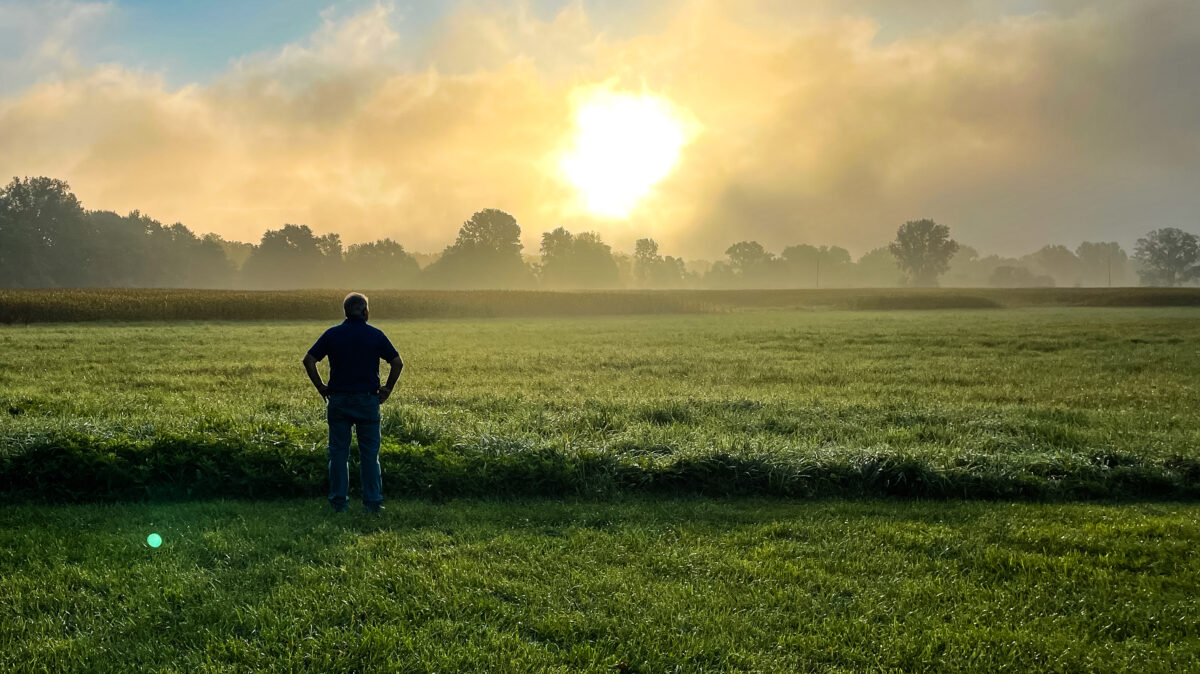Generations of Sustainability
Zippy Duvall
President

photo credit: AFBF Photo, Morgan Walker
Zippy Duvall
President
I’m a third-generation farmer. I love that it’s natural for farmers to speak of our calling in terms of generations. Just that word “generation” hints at a bigger story to tell. The story of how we adapt and change to keep fulfilling our calling and caring for our land. Sustainable practices are just what we do on the farm because we understand that we are caretakers of the land for a time. While some farmers may be the first generation in their family to care for the land, no one wants to be the last.
I wouldn’t be the third generation on my farm, and there surely wouldn’t be a fourth to follow, if we still farmed the exact way my grandfather did. Now, I don’t mean any disrespect to my grandfather and all the hardworking generations that came before. They worked hard and did their best with the tools available to them. They didn’t have the chance to see the strides we could make thanks to innovation and technology. The last 40 years alone in agriculture have changed the landscape, for the better. I believe my father and grandfather would be very proud of how my son and I are restoring the land they passed on.
Agriculture gets a lot of attention in discussions about climate and sustainability, and unfortunately, some unfair blame as well. But the facts are clear, agriculture is just 10% of overall emissions in the U.S. according to the Environmental Protection Agency. That stat surprises some folks who have been led to believe agriculture’s share is much higher. The truth is, this statistic just skims the surface of our sustainability gains and where we can go next. American farmers and ranchers are leading the world in climate-smart practices. From using smarter farm equipment and precision ag tools to embracing biotechnology, farmers today use less water, fertilizer and pesticides as they grow the food, fiber and fuel we all depend on.
Sustainability is at the heart of what we do and we aren’t finished yet.
For decades, farmers have adopted conservation practices that help us reduce water usage, turn the soil over less and keep nutrients in the fields. According to USDA, 90% of farmers have employed irrigation management and system updates to help conserve water. That same survey from USDA shows that more than 80% of farmland is being managed with reduced till or no till practices, and nearly two-thirds of farmers are using cover crops.
Farmers also play a leading role in growing the crops we turn into renewable fuel that increases our energy independence and reduces emissions. In 2021 alone, use of ethanol and biodiesel reduced annual GHG emissions by 95 million metric tons—that’s equal to taking 33 million cars off the road.
Again, that’s just part of the story. Sustainability isn’t a one-size-fits-all approach, but it does matter to farms of all sizes, in all regions. At Farm Bureau, we have collected stories from across the country to offer just a snapshot of how farmers are fulfilling our commitment to care for our land, air and water. Check out fb.org/sustainability and click through our interactive map to learn more. I’m pleased to report that we’re regularly adding stories to the map from farms across the country.
While agriculture’s overall share of emissions has held relatively steady in recent years, our productivity continues to increase. Just 30 years ago, it would have taken 100 million more acres to produce the same amount of crops that farmers are growing today.
Farmers are proud to meet the demands of our growing nation and world, but we cannot do this work alone. We need partners in our sustainability work, from our shared public investment through farm bill programs to innovative programs led by food companies that treat farmers as partners. We also need a renewed commitment by our nation to invest in the research and development that will help future generations make strides that we can barely dream of today.
On Earth Day, and every day, I am proud to be the third generation entrusted to care for my family’s farmland. I know there are millions of farmers and farm families around the country who share that same feeling. Sustainability is at the heart of what we do and we aren’t finished yet. Together, we can ensure that generations to come answer the call to grow safe and sustainable food, fiber and fuel supplies for our nation and our world.
Trending Topics
VIEW ALL